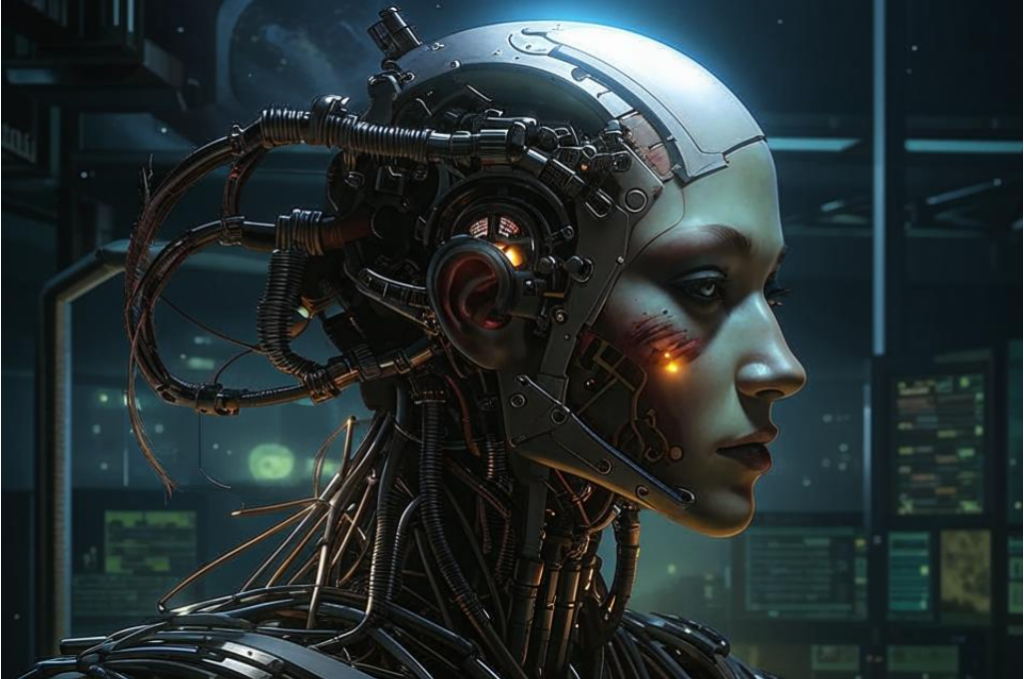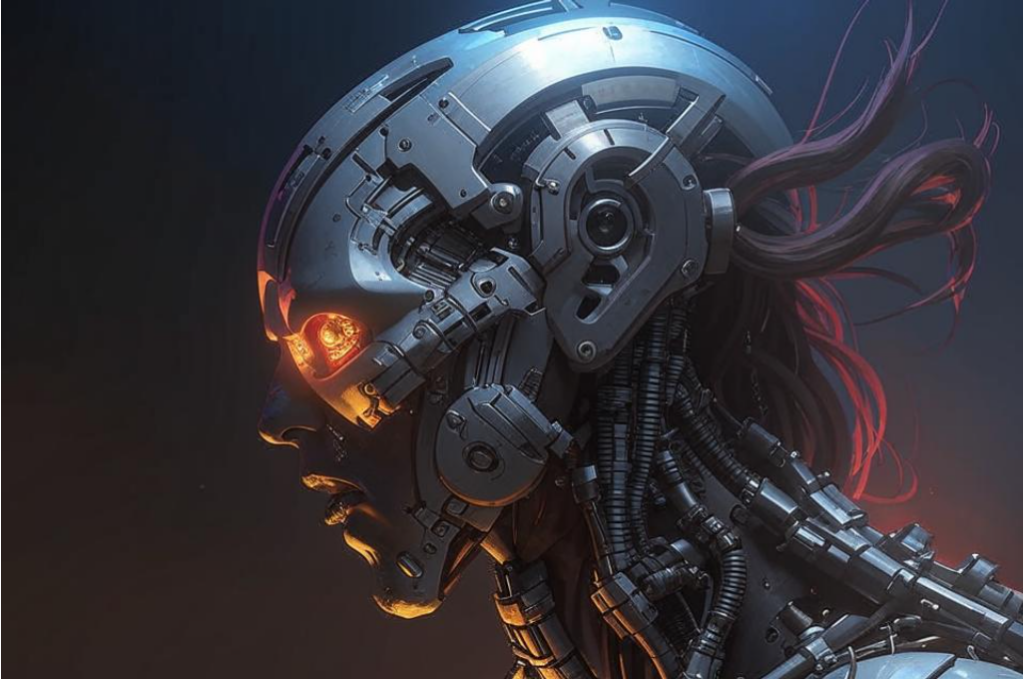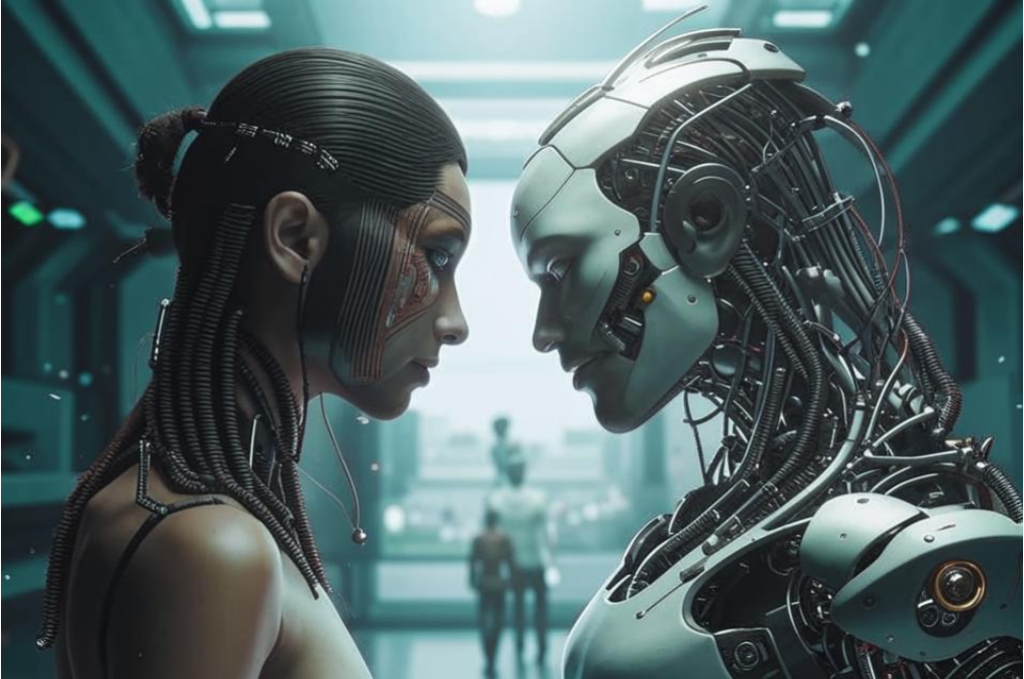Neural network and its impact on society

Neural networks, also known as artificial neural networks or simulated neural networks, are a subset of machine learning that provide the foundation of deep learning techniques. Its name and form are inspired by the human brain, and they replicate how real neurons communicate. Nowadays, many people speak about programs that make writing easier and faster, such as Chat GPT, or Quillbot. What are their benefits and drawbacks? Should people be afraid of AI and will AI ever replace humans?
In today’s lesson, we’ll discuss the pros and cons of AI and machine learning. The lesson is aimed at boosting listening and speaking skills, and enriching your vocabulary.
Task 1. Warm-up
Discuss the questions.
- What springs to mind when you hear the term “artificial intelligence“?
- What are the dangers of artificial intelligence?
- Will artificial intelligence ever be more intelligent than humans?
- How is artificial intelligence helping us today?
- Have you ever heard about Chat GPT and Quill bot AI? What are they used for? What other neural network tools do you know?
Task 2
Find the definitions of new words in the dictionary and make up your own examples.
- Game changer
- To outsmart
- To keep one step ahead of sth
- To mold
- To replicate
- To detect
- Pivotal
- Alignment

Task 3
Read the summary of the video you’re going to watch and express your opinion.
ChatGPT vs. Human Intelligence: Who Holds the Adaptability Edge? – BBC News
✦
ChatGPT is a game changer in natural language understanding.
- ChatGPT generates responses based on natural language understanding.
- It has the ability to write songs.
✦
AI is rapidly outsmarting humans.
- Google released a competitor to improve intelligence.
- Computers are surpassing their creators in intelligence.
✦
AI algorithms are gaining information from the internet.
- The algorithms can address various situations.
- The technology is becoming increasingly sophisticated.
✦
AI struggles to generalize learning across different environments.
- AI is not good at adapting and generalizing learning across different scenarios and environments.
- This is a challenge even for children and infants, showing the complexity of the task.
✦
Human adaptability surpasses AI.
- Our brains adapt and mold themselves efficiently from birth.
- Computers are far from being as adaptable as humans.
✦
AI algorithms lack human-like understanding and emotion.
- AI algorithms don’t have social interactions and personal relationships like humans do.
- Robots’ bodies don’t change and evolve like human bodies.
✦
Human brain’s adaptation to variability.
- Children and infants need to adapt to different bodies every day.
- Neuroscientists still don’t fully understand why our brains are adept at adaptation.
✦
AI still cannot replicate the full range of human intelligence.
- Computers are not going to come close to replicating human intelligence in the near future.
- ChatGPT acknowledges the limits of its own virtual mind and cannot replicate the full range of human intelligence.
Now watch the video and mark the sentences true, false, not mentioned.
- Chat GPT can write songs, define quantity mechanics, write texts on different topics for a person.
- A competitor to Chat GPT is Bard released by Microsoft.
- Computers are rapidly outsmarting their creators.
- AI can replace human beings in writing books.
- People’s adaptability is the main thing that keeps us one step ahead of AI.
True or false
Based on the text above, here are the evaluations of the statements:
- GPT can write songs, define quantity mechanics, write texts on different topics for a person.
- False (It should be “quantum mechanics,” not “quantity mechanics.”)
- A competitor to Chat GPT is Bard released by Microsoft.
- False (Bard was released by Google, not Microsoft.)
- Computers are rapidly outsmarting their creators.
- False (The video questions whether this is really true and highlights limitations of AI.)
- AI can replace human beings in writing books.
- False (The video does not make this claim and emphasizes that AI lacks the adaptability and range of human cognition.)
- People’s adaptability is the main thing that keeps us one step ahead of AI.
- True (The video specifically mentions that human adaptability keeps us ahead of AI.)
See the script
I’m designed to generate responses to questions based on my understanding of natural language. You’ve probably used it, and you’ve definitely heard of it. ChatGPT has been hailed as a game-changer. It can write songs from the story you want to tell, define quantum mechanics, and explain how you could boost your intelligence. Google has also released a competitor, Bard. Impressive, right? Computers seem to be rapidly outsmarting their creators, but is that really true?
We have a sophisticated view of these algorithms. What they are doing is getting a lot of information from the internet, so they are capable of addressing all kinds of situations and questions. However, they’re not very good at adapting. They’re not very good at learning something in one scenario or environment and then generalizing it to a different environment. This is something that children and infants are very good at. It’s our adaptability that keeps us one step ahead of AI. From birth, our brain adapts and molds itself to the environment in a very efficient way. We’re very, very far away from having computers that are highly adaptable.
I think maybe we’ll figure out how that happens, but the fact is these algorithms usually don’t have bodies, and even if they have bodies, they’re robots. The robots’ bodies don’t change, so their experiences are much less flexible. There is a lot less variability compared to children and infants, who need to adapt to different bodies every day. The truth is, neuroscientists still don’t know exactly how or why our brain is so good at adapting. Until we know better how this process works, computers are not going to come anywhere close.
Luckily, ChatGPT knows the limits of its own virtual mind; it cannot replicate the full range of human cognition.
Task 4

Discuss the questions.
- Will AI ever replace human beings? Why do you think so?
- What are the things that AI will never be able to do?
Now read the text and speculate on the questions about:
- AI relying on people.
- Starting an AI company.
- AI at MIT
- Data bottleneck
- Core setup of AI
- AI never replacing humans.
- AI in healthcare
The Myth of AI Dominance
When we think about the future of artificial intelligence (AI), it’s easy to be consumed by the dystopian visions portrayed in popular culture. From Terminator’s Skynet to the unsettling narratives of Black Mirror, the idea of machines surpassing and replacing humans can be both captivating and unsettling. However, as someone deeply immersed in the world of cutting-edge AI projects, I can assure you that this is far from the reality we’re facing.
In fact, the truth is quite the opposite. AI is not a threat to humanity, but rather a powerful tool that can enhance and supercharge our capabilities. The key is understanding the fundamental relationship between AI and humans, and how we can harness this technology to tackle the world’s greatest challenges.
The Symbiotic Relationship Between AI and Humans
At the core of AI’s success is its reliance on humans. AI algorithms and systems are not self-sustaining entities; they require human input, guidance, and oversight to function effectively. It’s this symbiotic relationship that has inspired me to dedicate my career to building AI infrastructure that empowers and amplifies human potential.
My own background has played a significant role in shaping this perspective. Growing up as the child of brilliant scientists at Los Alamos, I witnessed firsthand the transformative power of science and technology. Inspired by their work, I chose to pursue programming, driven by the desire to make a meaningful impact on the world.
As I delved deeper into the field of AI, I came to a profound realization: while computers and algorithms possess incredible processing power and the ability to analyze vast amounts of data, they fundamentally lack the judgment, intelligence, and nuance that are inherent to the human experience. It was this revelation that led me to the conclusion that AI will never replace humans, but rather complement and enhance our capabilities.
The Importance of Data and Human Insight
At the heart of AI’s success is the quality and quantity of data that powers it. Without high-quality, well-curated datasets, AI algorithms will inevitably produce unreliable and biased outcomes. This is where the critical role of humans comes into play.
Humans are the ones who understand the context and nuance required to properly annotate and label data, ensuring that AI systems are trained on accurate and representative information. It is this human insight and guidance that enables AI to make informed decisions and deliver meaningful, ethical outcomes aligned with our values and intentions.
In my own experiences, I’ve witnessed firsthand the challenges of building effective AI systems. During my time at MIT, I worked on a project that aimed to use AI to detect and interpret human emotions through facial expressions. While we achieved an impressive 80% accuracy rate, this success was only possible because of the human effort put into training the algorithm and ensuring the data was of the highest quality.
This realization led me to found Scale, a company dedicated to providing high-quality data and AI infrastructure to businesses and organizations. I recognized that without a strong foundation of human-curated data, AI would never reach its full potential.
AI as a Supercharger for Humanity
Rather than viewing AI as a threat to human dominance, I believe it is a powerful tool that can unlock our true potential. By automating repetitive and mundane tasks, AI frees up our time and energy to focus on the creative, strategic, and problem-solving aspects of our work.
In the field of healthcare, for example, AI can revolutionize the diagnostic process by analyzing vast amounts of patient data, identifying patterns, and flagging potential issues long before a human physician can. This not only saves time but also enables doctors to devote more attention to personalized care and developing innovative treatments.
Similarly, in the context of the ongoing Russia-Ukraine war, AI has proven invaluable in rapidly analyzing satellite imagery to detect troop movements, assess damage, and optimize the allocation of resources. By automating these time-sensitive tasks, AI allows human decision-makers to respond more effectively and make informed strategic decisions.
These examples illustrate how AI can be a supercharger for humanity, empowering us to tackle complex challenges and focus on the aspects of our work that truly require human creativity, judgment, and problem-solving skills.
Embracing the Future of Human-Led AI
As we look to the future, it’s clear that the path forward lies in the symbiotic relationship between humans and AI. By embracing this technology and leveraging it to enhance our capabilities, we can unlock unprecedented opportunities to solve the world’s most pressing problems.
Whether it’s revolutionizing healthcare, optimizing disaster response, or accelerating scientific breakthroughs, the potential of human-led AI is limitless. By aligning AI with our values and intentions, we can ensure that this technology serves as a force for good, empowering us to be more creative, more innovative, and more impactful than ever before.
I am proud to be at the forefront of this movement, working tirelessly to build the infrastructure and tools that will enable this future. It is my firm belief that by harnessing the power of human-led AI, we can create a better, more prosperous world for all.
Check your answers
AI relying on people:
The speaker emphasizes that AI algorithms and systems are not self-sustaining entities and require human input, guidance, and oversight to function effectively. The symbiotic relationship between AI and humans is essential for AI’s success.
Starting an AI company:
The speaker founded Scale, a company dedicated to providing high-quality data and AI infrastructure to businesses and organizations. This decision was driven by the recognition that without human-curated data, AI would never reach its full potential.
AI at MIT:
The speaker worked on a project at MIT that aimed to use AI to detect and interpret human emotions through facial expressions. The project achieved an impressive 80% accuracy rate, which was made possible by the human effort put into training the algorithm and ensuring high-quality data.
Data bottleneck:
The speaker highlights that the quality and quantity of data are critical to AI’s success. Without high-quality, well-curated datasets, AI algorithms will produce unreliable and biased outcomes. Human insight and guidance are necessary to annotate and label data accurately, ensuring AI systems are trained on reliable information.
Core setup of AI:
The speaker explains that while computers and algorithms have incredible processing power and can analyze vast amounts of data, they lack the judgment, intelligence, and nuance inherent to the human experience. This fundamental setup means that AI complements and enhances human capabilities rather than replacing them.
AI never replacing humans:
The speaker believes that AI will never replace humans but will instead complement and enhance human capabilities. This belief is based on the realization that AI lacks the judgment, intelligence, and nuance of human experience, making it more of a tool to augment human potential.
AI in healthcare:
The speaker notes that AI can revolutionize the diagnostic process in healthcare by analyzing vast amounts of patient data, identifying patterns, and flagging potential issues before a human physician can. This saves time and allows doctors to focus more on personalized care and developing innovative treatments.
Watch it
Watch the video referring to the text above and compare your answers. Have you changed your opinion? Do you share the speaker’s ideas?
What does the speaker say about?
- AI relying on people.
- Starting an AI company.
- AI at MIT
- Data bottleneck
- Core setup of AI
- AI never replacing humans.
- AI in healthcare
Task 6
Fill in the gaps with the necessary words: Game changer, to outsmart, to keep one step ahead of sth, to mold, to replicate, to detect, pivotal, alignment.
- He played a ___ role in the advancement of machine learning.
- Chat GPT has been held as a ___ bringing new ways of communication and writing.
- Computers seem to be rapidly ___ their creators.
- Our adaptability ___ us ___ AI making us unique.
- From birth our brain adapts and ___ itself to the environment in a very efficient way.
- AI can never ___ the full ability of human brain and intelligence.
- Some sounds cannot be ___ by the human ear, that why technology may be a good help.
- The problem is happening because the wheels are out of ___ with each other.
Check the answers
- He played a pivotal role in the advancement of machine learning.
- Chat GPT has been held as a game changer bringing new ways of communication and writing.
- Computers seem to be rapidly outsmarting their creators.
- Our adaptability keeps us one step ahead of AI, making us unique.
- From birth, our brain adapts and molds itself to the environment in a very efficient way.
- AI can never replicate the full ability of human brain and intelligence.
- Some sounds cannot be detected by the human ear, that’s why technology may be a good help.
- The problem is happening because the wheels are out of alignment with each other.
Task 7
Agree or disagree with the ideas and give details using the vocabulary on the list.
- AI will never replace humans.
- AI can be beneficial in healthcare.
- Using Chat GPT will help people save their time and get more success.
- Chat GPT will have a negative impact on people and we will not be able to make up a sentence on our own.
- Humans have made neural network to make people less educated.
Vocabulary
- Game changer
- To outsmart
- To keep one step ahead of sth
- To mold
- To replicate
- To detect
- Pivotal
- Alignment
Dear Student,
Click the image below, and I will become alive.
Congratulations on successfully completing the lesson about artificial intelligence! Your dedication and hard work have paid off, and you’ve taken an important step in understanding the fascinating world of AI. By mastering these concepts, you are now better equipped to appreciate how AI can be a powerful tool that enhances human capabilities.
Keep up the great work, and continue to explore and learn. The future of AI is full of exciting possibilities, and with your knowledge, you can be a part of shaping that future.
Best wishes for your continued success!
Sincerely,
[Your AI Assistant]
